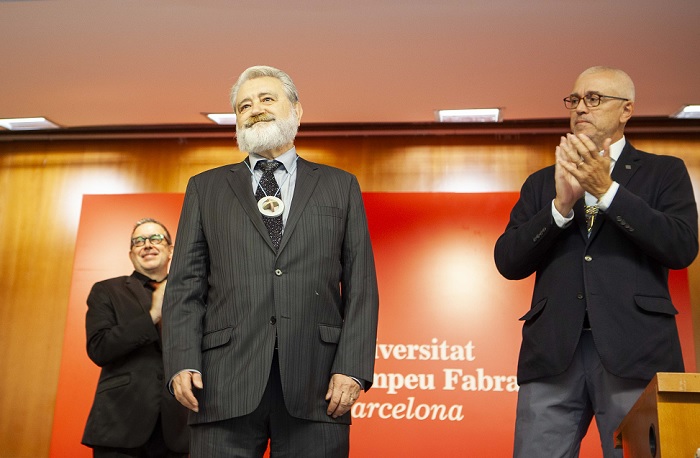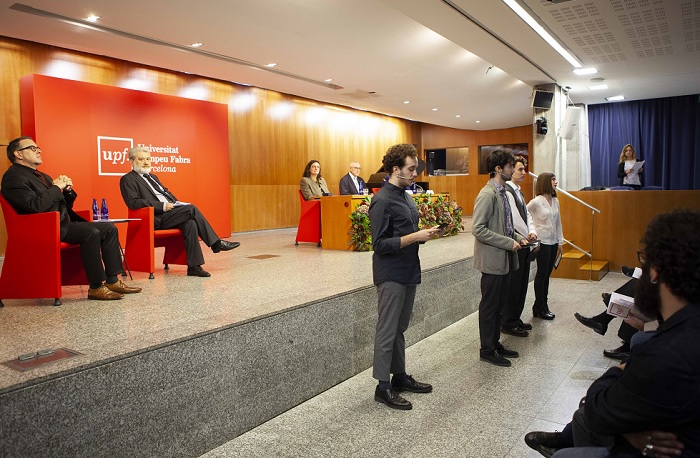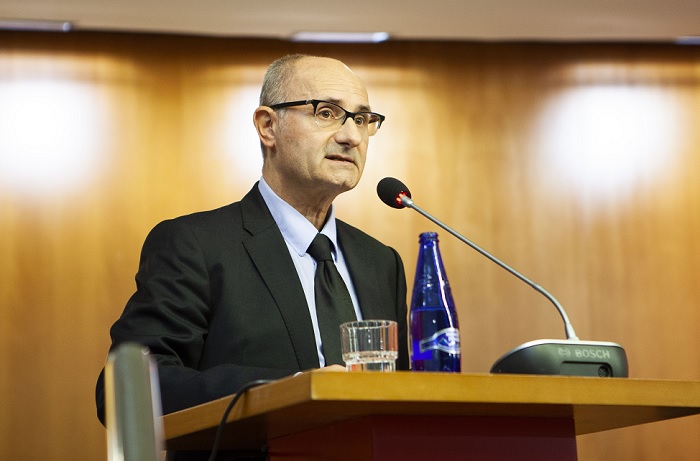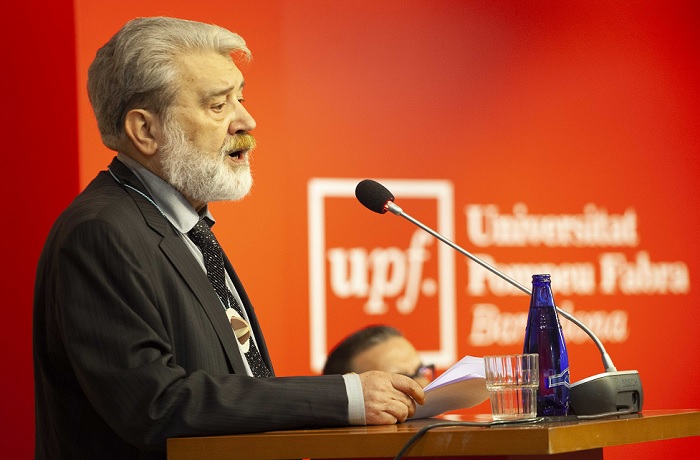“I have built my editorial mosaic using the best tesserae of knowledge I could gather”
“I have built my editorial mosaic using the best tesserae of knowledge I could gather”
Gonzalo Pontón, publisher, historian and writer, was awarded an honorary doctorate by UPF on 22 October in the auditorium of the Ciutadella campus. He was accompanied by his patron, Javier Aparicio Maydeu, full professor of the Department of Humanities and UPF Culture delegate, and Joaquim Albareda, full professor of the Department of Humanities and director of UPF’s Jaume Vicens Vives Institute of History, who gave the eulogy.

Gonzalo Pontón, publisher, historian and writer, founder of the Crítica and Pasado & Presente publishing houses, was awarded an honorary doctorate by UPF during a ceremony which took place on 22 October 2019, at noon, in the auditorium of the Ciutadella campus. The ceremony was presided by the rector of the University, Jaume Casals, who was accompanied at the presidential table by Mònica Figueras, vice-rector for social engagement and equality, and Pere Torra, general secretary.
Gonzalo Pontón is the 17th person to be made doctor honoris causa by the University since the 1999-2000 academic year
He is the 17th person UPF has made doctor honoris causa, the highest distinction that the University grants in recognition of a person’s scientific or university training or their values that can be seen to identify with the institution. Awardees are, therefore, people of great relevance for their special relationship with the university, for contributions to progress, science and culture.
The ceremony, which could be followed live via the University website and through social networks with the hashtag #PontónHonorisUPF, included a performance by the UPF Theatre Workshop and of two pieces for the piano rendered by Emili Blasco.
- Opening of the ceremony and reading the agreement by the Board of Governors
- Laudatio speech given by Joaquim Albareda
- Investiture of Gonzalo Pontón and acceptance speech
- Speech by Jaume Casals
- Short biography of Gonzalo Pontón
- Photo album of the event posted on Flickr
- Video summary of the investiture ceremony posted on YouTube
Opening of the ceremony and reading of the agreement by the Board of Governors

After the entrance of the academic authorities to the sound of “The Well-Tempered Clavier Book One Prelude” by Johann Sebastian Bach, performed by the pianist Emili Blasco, Jaume Casals opened the event. Then, Pere Torra, UPF general secretary, read the agreement by the Board of Governors of 14 December 2018 awarding the title of doctor honoris causa by UPF (at the proposal of the Department of Humanities) to Gonzalo Pontón.
The agreement mentions UPF’s desire to grant him this distinction “for being a benchmark in the dissemination of historical, political, humanistic, literary and scientific thought of the highest intellectual calibre, through his work as a publisher and historian”.
With the public standing, the candidate, accompanied by his patron, Javier Aparicio Mayeu, full professor of the Department of Humanities and UPF Culture delegate, entered the auditorium to the sound of “Sarabande from Suite in D minor” by Georg Friedrich Händel, again played by Emili Blasco on the piano.
Then, members of the University Theatre Workshop performed a dramatized reading of two of the candidate’s favourite texts: “Questions from a worker who reads” by Berthold Brecht, and “De Vita Beata” by Jaime Gil de Biedma.
Laudatio speech given by Joaquim Albareda

>
Joaquim Albareda, full professor of the Department of Humanities and director of UPF’s Jaume Vicens Vives Institute of History (IUHJVV), undertook the delivery of the laudatio speech.
> Laudatio by Joaquim Albareda (pdf document, in Catalan, 8 pages)
> Video of the laudatio by Joaquim Albareda (31.34 min)
Excerpts from the laudatio speach
“Pontón is one of the great publishers (possibly the most important active publisher) in the last fifty years in Spain, and he has also carried out his work in close alliance with the academic world. He is, moreover, a publisher who is highly aware of the social commitment of his work and who understands publishing as an instrument of cultural intervention to provide society with the tools to understand the world”.
“It is true that part of the success of his work as a publisher lies in the fact that Gonzalo Pontón has managed to weave crucial partnerships with some of the leading names in humanistic and scientific thought of the Catalan and Spanish university. The three fundamental benchmarks in this regard, for their relevance and duration, are Josep Fontana, Manuel Sacristán and Francisco Rico, with whom he has enjoyed fruitful collaboration over the years.
“His collaboration with Ariel was undoubtedly a heroic enterprise: both in the sense of the radical renewal of the bibliographic scene and the political-ideological commitment against the dictatorship and to build a better society”.
“Over the nigh-on thirty-five years that he set the course for Crítica, Pontón turned the publishing house into the main benchmark in the publication and dissemination of historical, political, scientific and humanistic thought of the highest intellectual calibre, both regarding Spanish and international authors, with a catalogue of over five hundred thousand references”.
“In this last stage the publisher-historian became a historian tout court, and in 2016 he published “La lucha por la desigualdad. Una historia del mundo occidental en el siglo xviii”, a solid contribution to the social history and the ideas of eighteenth-century Europe which warranted the National Essay Award (2017)”.
“It is because of his extensive track record in the publishing world, marked by excellence, which I would not have been able to reconstruct in such detail without the indispensable help of Gonzalo Pontón Gijón, to whom I would like to express my gratitude, but also characterized by his strong commitment to knowledge, with a critical awareness, freedom and equality, that Pompeu Fabra University has wished to distinguish Gonzalo Pontón with the title of doctor honoris causa”.
Investiture of Gonzalo Pontón and acceptance speech

The laudatio speech concluded, the most solemn moment of the ceremony arrived, the investiture of Gonzalo Pontón, when he received the medal of honoris causa by UPF from the rector, Jaume Casals, who gave him a fraternal embrace signalling his becoming a member of the University’s Senate of doctors.
“You have been appointed doctor honoris causa by the UPF Board of Governors in witness and recognition of your significant merits. By virtue of the authority conferred in me, I award you this medal, a symbol of this title, and the diploma”, said the rector.
And as a new doctor by UPF, Gonzalo Pontón gave his acceptance speech.
> Video of the acceptance speech (06:31 min)
Excerpts from the speech by Gonzalo Pontón
“Let me tell you right away that I have never regarded my job as work but as a continuous celebration, and the book gods have always blessed me -for some esoteric reason to do with their irrational status- with all kinds of ventures that have made my job as a publisher constantly and permanently rewarding. So, I wondered: why does a life of reward deserve an award? I’ve tried to ascertain this”.
“It may be that the Board of Governors has mirrored itself on the mosaic that I have built up over 55 years of publishing work. If this is the case, I must say proudly, perhaps arrogantly, that the Board was not mistaken: the mosaic is indeed splendid”.
“From the first (Manuel Sacristán), one of the most important philosophers of the twentieth century, I learned to think logically and understand that intellectual work entails great personal responsibility. From the second (Josep Fontana), one of the most important historians of the twentieth century, I learned almost everything. Josep Fontana, a professor of this University, founder of the Jaume Vicens Vives Institute of History, who died, only biologically, 14 months ago, was for some 50 years the master and friend everyone would like to have”.
“For me, the ultimate purpose of history, beyond agreeing to use all the materials to make it, was the complete understanding of the world. I then thought -and I still do- that all human knowledge is part of history”. [...] Historical science, at least the historical science I love, is not a cold science; it is a tool for the formation of a critical conscience”.
“I have said I’ve been very fortunate in my work as a publisher. I should also have said that this work has been a blessing for me because, among other things, it has allowed me to cultivate friendship and, if you forgive my presumptuousness, also the affection of some of the giants of world historiography”.
“The publishing mosaic is like Penelope’s veil: it must be restarted every day. When in 2009 I turned 65, my partners decided it was time for me to retire. Pity them, they did not realize that you can’t retire a passion for publishing”.
“Once again the book gods smile on and flatter me: now, taking advantage of Pompeu Fabra University as only they can, I am invited, to say it in the verses of Joan Brossa, to climb up on the pedestal with arrogance... /And I without ceasing to be surprised.... (“al pedestal amb altivesa…/ I jo sense sortir de la sorpresa…”).
Speech by Jaume Casals
Now in the last part of the ceremony, Jaume Casals delivered the closing speech, which he began with a thought for Salvador Giner, who died recently, “a good companion, as a professor at UPF fleetingly, and at the Institute of Catalan Studies”.
The UPF rector, referring to one of the authors of Gonzalo Pontón’s catalogue, said “I cannot fail to comment on Carlo Maria Cipolla’s laws of human stupidity: these days we are witnessing confirmation of human stupidity in Catalonia and in Spain”. And he added: “As in astronomy, where laws are formulated and confirmed a few years later, we are verifying the data amassed to date, we are approaching final confirmation”.
Then, and to illustrate the meaning of history, Jaume Casals paraphrased Nietzsche: “The verdict of the past is like the oracle’s verdict: we won’t understand it if we are not builders of the present and architects of the future”. In this regard, for the UPF rector, historians are a basic aspect for the university: “History should be understood like in ancient times, a kind of genre, research, close to the word ‘criticism’. It is like the heart of the university and all its areas”, he stressed.
Finally, Jaume Casals invited everyone to think of books as the “centre” of the institution: “At this university, if we refer to the quality it may have, it has such because it is perched on top of all the books that have been read by all of its members, and also those written by them”, he concluded.
Short biography of Gonzalo Pontón

Gonzalo Pontón Gómez (Barcelona, 1944) graduated in Modern and Contemporary History from the University of Barcelona. He has spent his entire working life, spanning nearly 55 years, in the publishing industry. As a historian, he has taken an interest in issues such as enlightenment, capitalism, liberalism and social inequality.
He started in 1964 at Ediciones Ariel, where he worked as a proofreader and where he was editor in the early 1970s. In 1976, with the financial support of Juan Grijalbo, he founded Crítica (bought by Planeta in 1999), to publish essays censored by the dictatorship. Here he received the National Award for Best Cultural Publishing Work (2007) and was CEO until his retirement in 2009, after publishing more than 2,500 references. One of his most important milestones at Crítica was the publication of “Memorias, Cuadernos Robados y Obras”, by Azaña, which reached 100,000 units.
In 1976 he founded the Crítica publishing house to publish essays censored by the dictatorship
In 2011 he founded the publishing house Pasado & Presente, which he currently chairs and where he publishes selected books (no more than 16 a year), with print runs of between 2,000 and 2,500. For his work La lucha por la desigualdad: una historia del mundo occidental en el siglo XVIII, the first published by Pasado & Presente, he was awarded the National Essay Award in 2017, granted by the Ministry of Education, Culture and Sport.
He has been the director of Gran Diccionario Enciclopédico Grijalbo, CEO of the Grijalbo-Mondadori Group, and director of Grupo Planeta’s University Division. He chaired the Catalan Chamber of Books (1994-1998) and the foreign trade committee of the Federation of Publishers Guilds of Spain. He was a member of the Board of Directors of the Catalan Publishers Guild and representative of Spain on the International Publishers Association’s Freedom to Publish Committee.
Photo album on the event posted on Flickr
> Photo album on the event posted on Flickr
Video summary of the investiture ceremony posted on You Tube
> Video summary of the investiture ceremony posted on You Tube

